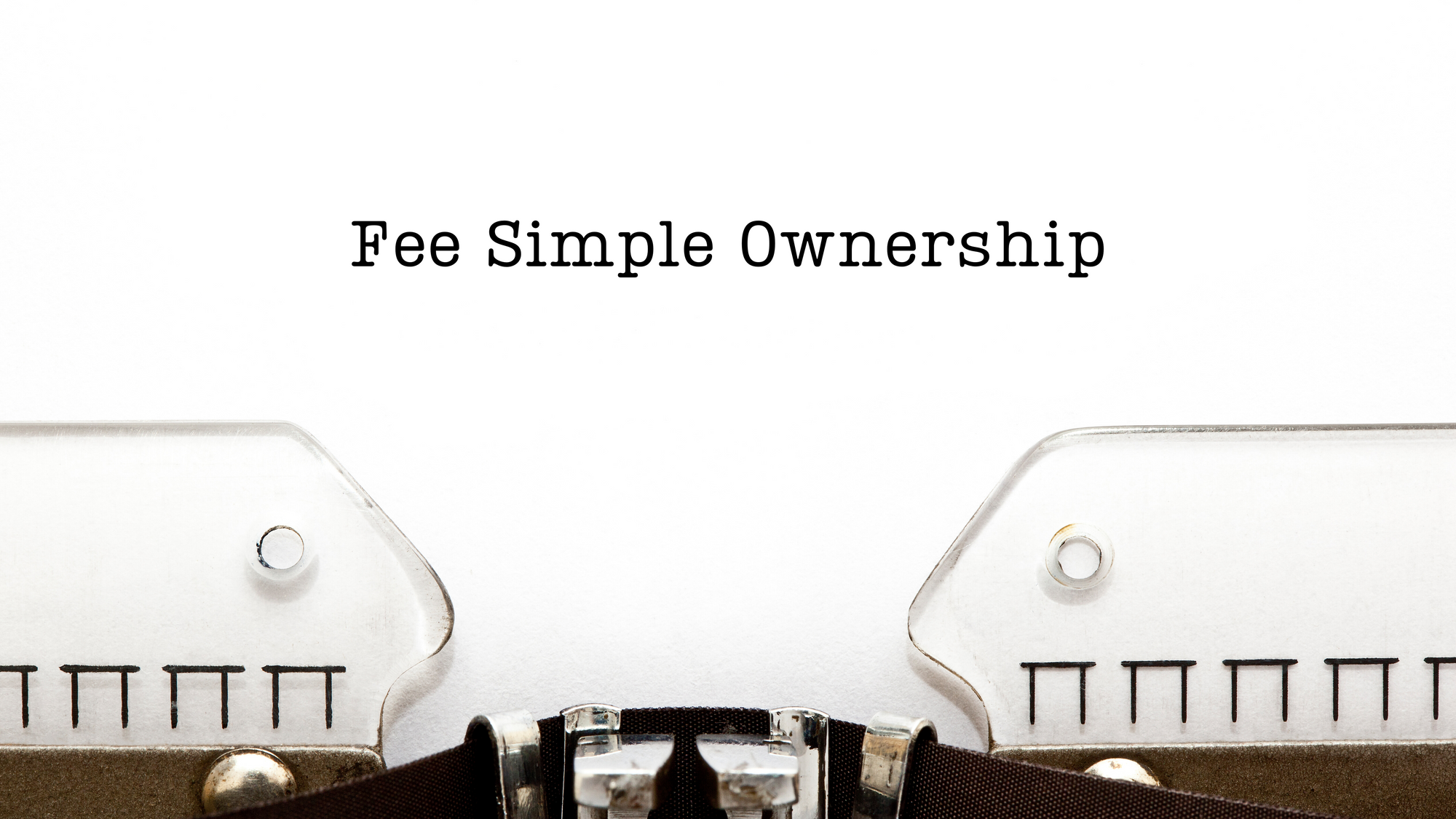Owning a residential property gives you some sense of freedom and happiness. But that only happens if you have full ownership rights of the property where you have the freedom to do as you wish, including property modifications. Fee, simple estate ownership, gives you that right. If you’re buying a house in the United States, you have high chances of getting a fee simple because this is the most common ownership in the country.
But do you have any idea what it means to have fee simple absolute ownership? Do you know your rights as a fee simple owner? Let’s have a complete look at what fee simple means and any other details related to it.
What Is Fee Simple Estate Ownership?
Fee simple means outright ownership. You’ll have the broadest rights to the property, including the structure, the land, and any minerals under it. You’re not restricted to anything as long as you have the titles to the property.
With a fee simple ownership, you have the right to do whatever you wish on your land. You can build a second house, extend the main bedroom, or build a garage. No one will penalize you even if you decide to tear down the entire property and erect a new one in your design and size. You can also choose to sell the land at any market value to anyone you choose. You can pass this property as an inheritance to anyone.
Fee simple estate is the highest and most common form of property ownership in the United States. But having a fee for simple ownership doesn’t mean you’re immune to losing the property. If you commit some violations or fail to pay property taxes, individuals or the government can still file liens against that property. You can still lose this property through a foreclosure.
Types of Fee Simple Ownership
There are two types of fee simple ownership. These are absolute fee simple and defeasible ownership.
What is Absolute Fee Simple?
Absolute fee simple is the best form of real estate property ownership. The ownership method is sometimes called freehold as it gives the owners the freedom to do whatever they wish on the land. They’re only subjected to liens, zoning taxation, local guidelines, and criminal laws.
Some zoning laws that may restrict the property owner is operating a retail store in an area zoned as residential and not paying local property taxes.
You have the right to sell, give away, or develop the property. If you’re passing it to heirs, you’re allowed to include specific conditions in a final arrangement. Some conditions state that the main house can’t be torn down. Others state that the property must always belong to the family; hence, the heirs can’t sell it.
You can also choose to be the sole owner of the land and never transfer to anyone as long as you live. You won’t have any problems with the law or individuals as long as you make your mortgage payments and pay estate taxes.
What is Fee Simple Defeasible Ownership?
There’s a slight difference between fee simple absolute and fee simple defeasible. The defeasible ownership is less powerful. The owners have full ownership of the land as long as they live, provided they meet certain conditions. These conditions are put in place by the previous owner, and violating any of them can make them lose the property.
Some conditions may state that the property should remain a residential one forever. Turning that property into a hotel or any other business premise will mean that you’re violating the deed covenant, and you might lose it. The property will revert to the original owner.
Fee simple defeasible conditions are usually put in place to preserve something special about the property. If you enter such a deal, you must align with the visions concerning the property’s future. Here are some possible restrictions to fee simple defeasible ownership:
- Taxation
- Police power
- Escheat can revert to the state
- The government can seize the property for its use
- Restrictions on the use of property
Fee Simple Ownership Rights
If you’re buying a property under fee simple ownership, you must understand your rights. You need to know everything you’re entitled to as far as your property is concerned. You also need to know what you can use it for. Here are all the rights for fee simple ownership.
- Air rights
- Mineral rights
- Inheritance rights
- Structure modification
- The right to sell your property to anyone at any time
- Rental rights
Fee Simple Estate Limits
As far as you have the rights to use your property as you wish, fee simple ownership is also subject to various laws and regulations from the state, city, and community at large. Consider all the community covenants and zoning laws when acquiring a fee simple property. The government can also take the land for public use whether you have a fee simple or not.
Having a fee simple ownership on your property doesn’t mean you can commit a crime and get away with it. You can’t kill anyone or hide anyone in your property even if you have a fee simple ownership.
You’re also obligated to continue paying your taxes and any mortgages you owe for the property. The lender or government still has the right to put your property on liens with the fee of simple ownership. There are many more things that fee simple ownership won’t exempt you from.
Aside from the zoning laws, community covenants, and the absence of eminent domain, absolute fee simple ownership is the closest you can get to own a property without too many restrictions. The ownership safeguards all property owners against laws and regulations dictating what you can and can’t do to your property.
Fee Simple vs. Leasehold
Even fee simple is considered the most common form of ownership in the United States, it doesn’t apply everywhere. If you own condos or townhomes, fee simple may not be your ownership method. Check your deed carefully, as they most likely contain lease estate ownership.
If you own an apartment or a townhome, you don’t have ownership rights to the land beneath it. If you wish to sell your house, you’ll need the approval of the community board of directors. The board has the right to approve the sale and accept the new owner.
Leasehold occurs when the lessor or the property owner enters an agreement with another person to use the apartment. You get leasehold ownership when you lease a property which allows you to use the property for a given period. You can modify the property but won’t sell or give it away.
Should You Go for Fee Simple Ownership?
Fee simple estate is the best option for those who want the freedom to modify, maintain, and pass over their property without restrictions. When buying a property, make sure the title is clear and beware of all state law variations as far as you also need to practice your rights.If you’re not sure about what you’re doing, SimpleShowing can help you figure out what fee simple means and how it applies to real estate ownership. We can also help you find the right estate ownership that suits your specific needs.
Conclusion
Understanding the nuances of fee simple ownership is crucial for anyone involved in property transactions. Fee simple absolute owners enjoy the most extensive ownership rights, controlling both the land and the structures on it without the limitations of a life estate. However, it's important to distinguish this from fee simple determinable and fee simple subject to condition subsequent. In the case of fee simple determinable, the property reverts to the original owner if certain conditions are violated. Conversely, with a fee simple subject to a condition subsequent, the original owner has the right to reclaim the property if specific conditions are breached. These distinctions are vital for fee simple owners to understand, ensuring they are aware of any potential limitations to their fee ownership.
Moreover, comprehending the different types of fee simple estates is essential for a comprehensive grasp of property ownership. Fee simple estates offer a range of ownership possibilities, from the unrestricted rights of fee simple absolute owners to the conditional ownership seen in fee simple determinable and fee simple subject to condition subsequent arrangements. Potential property owners must recognize these differences to make informed decisions. For those seeking the most autonomy over their property, fee simple absolute provides the greatest freedom. However, those who are comfortable with certain restrictions might find fee simple determinable or fee simple subject to condition subsequent more appropriate for their needs. Ultimately, understanding these distinctions is paramount in navigating the complexities of property ownership effectively.






